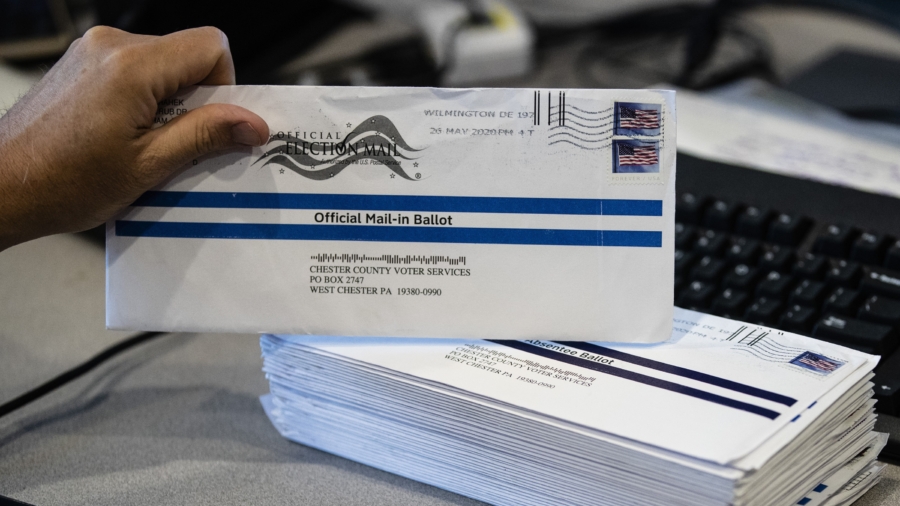The Pennsylvania Supreme Court on Friday ruled unanimously to prohibit counties from rejecting mail-in ballots because a signature on the ballot may not match the one on the voter’s registration form.
The ruling represents a setback for the campaign of President Donald Trump and the Republican National Committee (RNC), which pushed for a strict matching requirement in Pennsylvania, which Trump narrowly carried in 2016.
“We conclude that the Election Code does not authorize or require county election boards to reject absentee or mail-in ballots during the canvassing process based on an analysis of a voter’s signature on the ‘declaration’ contained on the official ballot return envelope for the absentee or mail-in ballot,” the justices wrote in a 30-page decision (pdf).
The verdict follows a request for declaratory relief filed on Oct. 14 by the state’s top election official, Kathy Boockvar, which centered on the question of whether the Election Code allows or requires counties to reject voted absentee or mail-in ballots “based on signature analysis where there are alleged or perceived signature variances.”
In her filing, Boockvar argued that any such rejections pose “a grave risk of disenfranchisement on an arbitrary and wholly subjective basis,” and do not give voters the opportunity to verify their signature before their ballot is rejected.
In guidance last month from Pennsylvania’s Department of State to counties, Boockvar said state law does not require or permit officials to reject a mail-in ballot solely over a perceived signature inconsistency.
“As a result of this case, Pennsylvania voters can cast their vote without fear that their ballot could be rejected solely because an election official—who isn’t trained in handwriting analysis—thinks their signatures don’t match,” said Mark Gaber, a Campaign Legal Center lawyer, in remarks to The Associated Press following the issuance of the guidance.

Gaber represented two groups that initially filed—and later dropped after the guidance was announced—a lawsuit in federal court that sought to ensure voters have the chance to fix ballots flagged for a perceived signature mismatch.
Senate Majority Leader Jake Corman, a Republican, accused Boockvar of undermining election integrity, arguing that her interpretation amounts to “signatures required on the mail-in ballots being meaningless.”
“People voting in person are now being held to a higher standard than those who mail in their ballots,” Corman said in a statement.
Boockvar’s request to Pennsylvania’s Supreme Court came several days after the Trump campaign and the RNC raised the matter in a broader, election-related federal court case in the Keystone state, requesting Boockvar’s guidance to be declared unconstitutional.
The Trump campaign and the RNC argued that Pennsylvania’s election code makes it clear that officials are required to compare the information on the mail-in ballot envelope, including a voter’s signature, to a voter’s information on file to verify whether that person is qualified to cast a legitimate vote.
“The mandatory language of these provisions makes clear that the consequence of a failure to verify a voter’s qualification through signature comparison is the denial of that application and the setting aside of that elector’s voted ballot,” the Trump campaign and the RNC wrote in its filing.
But the justices disagreed, arguing that the Election Code on mail-in ballots only requires a voter’s signature on the ballot envelope, but not a matching signature.
“Consequently, in comparing a declaration against these lists, a county board may determine only whether the name and address information the voter has listed on the ballot envelope matches. There is no signature information in these lists for county election officials to compare against a voter’s signature on his declaration; therefore, pursuant to the plain language of the Election Code, these lists cannot facilitate the signature comparison Intervenors maintain is required,” the justices wrote.
Friday’s ruling was the second major court victory in Pennsylvania for Democratic allies and voting rights advocates.
On Monday, the U.S. Supreme Court upheld Pennsylvania’s court-ordered extension for mail ballots, which must be accepted if received up to three days after Election Day, provided that they are postmarked by Nov. 3.
In this year’s presidential election, Pennsylvania is bracing to receive more than 3 million mail-in ballots, over 10 times more than in 2016.
From The Epoch Times


